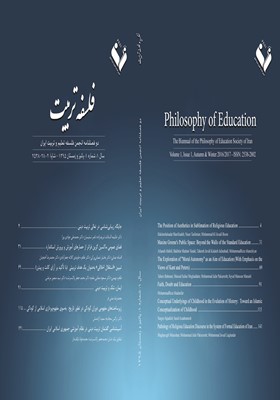الگوی تربیتاخلاقی وظیفهگرا با تأکید بر رفتارهای نامطلوب در دیدگاه کانت (الگوی پیشگیرانه)
محورهای موضوعی : تاریخ و ماهیت رشته فلسفهٔ تعلیموتربیت، مکاتب و رویکردهای فلسفهٔ تعلیموتربیت قدیم و جدید ،تاریخ اندیشه و عمل تربیتی (سیاستها، برنامهها، اقدامات و...) مفاهیم، گزارهها و نظریههای تربیتی آراء مربیان و فیلسوفان تربیتی روششناسی پژوهشهای تربیتی انواع تربیت مسائل تعلیموتربیت ایران و جهان برنامه درسی و آموزش در رشتههای گوناگون
شهناز شهریاری نیسیانی
1
,
رضاعلی نوروزی
2
![]()
1 - دانشگاه اصفهان
2 - دانشگاه اصفهان
کلید واژه: کانت, اخلاق وظیفهگرا, رفتارهای نامطلوب, تربیت اخلاقی, الگوی پیشگیرانه,
چکیده مقاله :
هدف این پژوهش تدوین الگوی پیشگیرانه تربیت اخلاقی وظیفهگرا با تأکید بر رفتارهای نامطلوب در دیدگاه کانت است. روشهای مورد استفاده، روش توصیفی ـ تحلیلی و روش استنتاجی بر مبنای الگوی بازسازی شده فرانکنا است. طبق نتایج حاصل، با توجه به دو دسته تکلیف فضیلت موجود در دیدگاه کانت یعنی تکالیف کامل فرد نسبت به خود و تکالیف ناقص (تکالیف ناقص فرد نسبت به خود و تکالیف فضیلت در قبال دیگران)، رفتارهای ناقض تکالیف کامل فرد نسبت به خود، رفتارهای ناقض تکالیف ناقص فرد نسبت به دیگران، و ترک فضیلتی که منتج به رذیلت شود، به عنوان سه نوع رفتار نامطلوب موجود در این دیدگاه شناخته شدند. پیشگیری به عنوان بُعدی از تربیت اخلاقی در گستره رفتارهای نامطلوب، در نظام تربیت اخلاقی کانت نیز مبانی، اصول و راهبردهای ویژه خود را دارد. بدین صورت که دو اصل احترام به کرامت خود و احترام به کرامت دیگران که برگرفته از مبانی خردورزی و غایت فینفسه بودن انسان هستند، اصول حاکم بر راهبردهای پیشگیری از بروز اولیه رفتار نامطلوب را تشکیل میدهند. این راهبردها که راهبردهای تربیتیاند، برای هر سه نوع رفتار نامطلوب، دو راهبرد اصلی تشکیل منش پسندیده و مراقبت و تقویت منش میباشند که نقش مهمی در تحقق هدف تربیت اخلاقی کانت یعنی حداکثر برخورداری از فضیلت اخلاقی دارند. همچنین، پیوند این راهبردها با مبانی و اصول در الگوی پیشگیرانه مشخص شدهاند.
This study aims to develop a preventive model of deontological moral education with an emphasis on undesirable behaviors in Kant's view. The methods used are descriptive-analytical and inferential methods based on Frankena's reconstructed model. According to the results, regarding the two categories of virtue tasks in Kant's view, namely, one's perfect duties towards himself/herself and imperfect duties (one's imperfect duties towards oneself and duties of virtue towards others), three types of undesirable behavior were identified in this view: behaviors violating one's perfect duties towards oneself, behaviors violating one's imperfect duties towards others, and abandonment of virtue that would lead to vice. Prevention as a dimension of moral education in the expanse of undesirable behaviors in Kant's system of moral education also has its principles and particular strategies. In such a manner that the two principles of respect for one's dignity and respect for the dignity of others, which are derived from the principles of rationality and the end of being human in one's self, constitute the principles governing strategies to prevent the initial emergence of undesirable behaviors. These strategies, which are educational strategies, for all three types of undesirable behavior, consisting of the two main strategies of forming a good character and caring for and reinforcing the character, which plays an important role in achieving Kant's goal of moral education, which is to have maximum moral virtue. Also, the connection of these strategies with the fundamentals and principles in the preventive model are specified.


